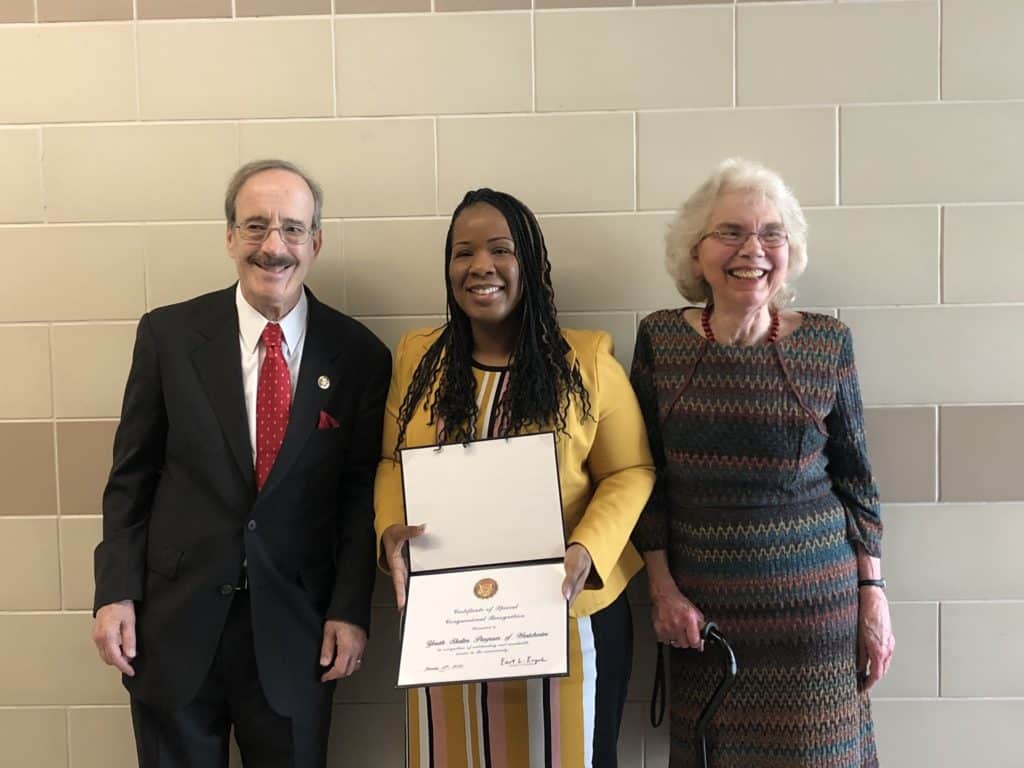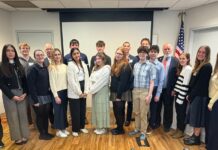
‘What Would Dr. King Think About Mass Incarceration Today?’
More than 150 people gathered to honor Elizabeth Saenger at The Larchmont/Mamaroneck Human Rights Committee’s 33rd annual Dr. Martin Luther King Jr. Commemoration on Jan. 12. Saenger was recognized for her decades of service in the area of social justice in Westchester County.
Saenger is one of the founders of the Youth Shelter Program of Westchester, an organization that provides a home-like alternative to jail for young men awaiting disposition of various criminal charges. The program was conceived of 40 years ago by Saenger and Judge Joseph Clifford, a Westchester judge, who both recognized the need for early intervention in the lives of young offenders.
The stage was full of elected officials including Congressman Eliot Engel, Assemblyman Steve Otis, County Legislator Catherine Parker, Mamaroneck Town Supervisor Nancy Seligson, Mamaroneck Village Mayor Tom Murphy, and Elizabeth’s close friend, Mamaroneck Village Trustee Kelly Wenstrup – as well as many more.
All honored Saenger with proclamations and words of profound respect acknowledging not only the impact of her work, but also her unstoppable force for good.
Joanne Dunn, executive director of YSPW, also accepted an honor for the shelter and highlighted several young men from the program who were present at the event.
The audience was then graced with an eye-opening speech by Marlon Peterson, a formerly incarcerated man who, after a decade in prison from age 19 to 29, has become a national advocate for prison reform. Peterson addressed the institutional roots of today’s system of mass incarceration and addressed hard challenges, such as bringing education to prisoners, finding the humanity in all humans, sticking with bail reform in the face of violent crimes, and more.
Having just returned from a trip to Ghana, he described his own personal journey to “a full circle of freedom.” He connected the slave trade and the very edifices of those practices in Ghana to the same structures of mass incarceration in America today. Peterson said he trip moved him not to despair, but to realize that after centuries of oppression and continuing racial inequity in America, he and many other people of color persist and are still standing up for freedom.
He shared many historical, political and mainstream anecdotes that point to toxic narratives about black people that continue to this day, which set a precedence for oppression and can be directly linked to mass incarceration.
Peterson asked the audience: “What Would Dr. King would think about mass incarceration today?” He pointed out that many Americans consider King a great, kind and peaceful social justice advocate. But, despite this, he was once deemed “the most dangerous man in America” by the FBI and eventually assassinated, along with many other black and white social justice leaders of the Civil Rights Movement.
He closed by challenging each attendee to recognize the inaction of those who did not help the Civil Rights Movement at that time. We must work now to see where we should be taking more action in the area of racial equality today – starting with an examination of the injustice of incarceration, he said.
Ultimately, prisons “break more than they heal” and we are the generation that will be held accountable for that, according to Peterson.
Following his keynote, Peterson was interviewed by Mamaroneck High School students Maria Haralampopoulos, James Hickey, Sascha Melamed, Jacinta Smith and Louisa Tantillo. The students asked Peterson how to bridge their lives of privilege with the challenges of those who are less fortunate when they do not share any lived experiences with those people. He encouraged today’s youth to start by seeing the humanity in all people – even those who make mistakes – and to recognize that, but for different circumstances, any human is capable of making terrible errors.
This event is offered through sponsorship support from the Coalition for Understanding Racism through Education, and Community Resource Center in Mamaroneck. CURE is a non-profit, volunteer, community advocacy group that works to bring education to Larchmont and Mamaroneck on the subject of institutional and systemic racism in the local community and the country. To learn more about CURE, visit: www.learnwithcure.com





